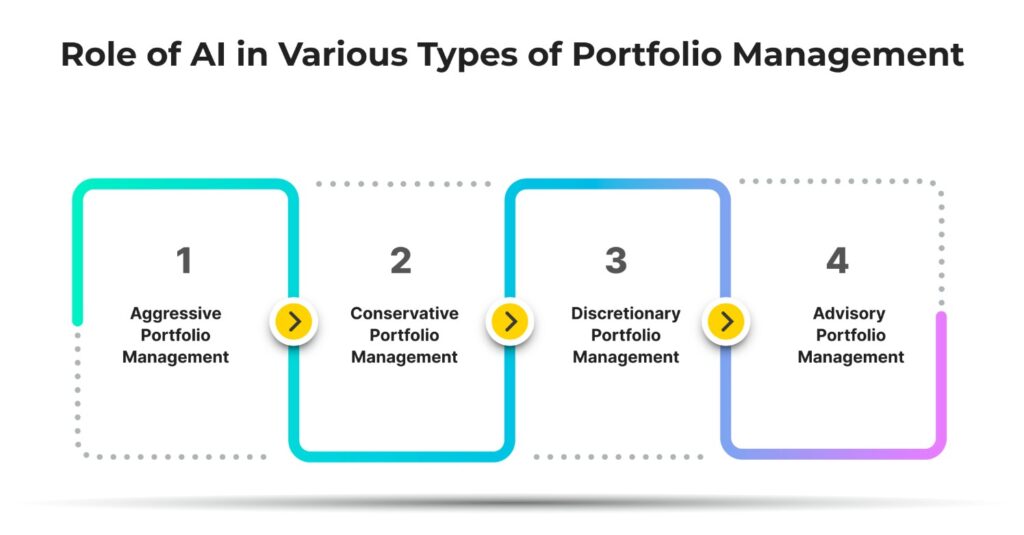potentially better returns. But the big question is: Can AI really manage your investment portfolio?

How AI Works in Investing
AI in finance uses machine learning, data analysis, and predictive algorithms to process massive amounts of information. It can analyze market trends, economic indicators, company reports, and even social media sentiment much faster than any human could.
For investors, this means:
-
Real-time monitoring of markets and assets.
-
Faster detection of opportunities and risks.
-
Data-driven decision-making, not emotions.
Robo-advisors are the most common example of AI-powered investing. Platforms like Betterment, Wealthfront, and many brokerage apps now use algorithms to recommend asset allocations based on your goals, risk tolerance, and investment horizon.
Benefits of AI in Portfolio Management
1. Objectivity and Discipline
Human investors often make emotional decisions—panic selling in a downturn or overbuying during a rally. AI, on the other hand, follows data and rules. This discipline can help keep your portfolio balanced and aligned with long-term goals.
2. Cost-Effective Investing
Traditional financial advisors may charge significant fees for managing investments. AI-based platforms usually offer lower costs, making professional-style portfolio management more accessible to everyday investors.
3. Personalization at Scale
AI doesn’t just offer a one-size-fits-all approach. By analyzing your income, risk profile, goals, and market conditions, it can create a personalized strategy and adjust it over time. This makes portfolio management more dynamic and tailored.
4. Continuous Monitoring
Markets move quickly, and opportunities can vanish within minutes. AI systems operate 24/7, constantly scanning for signals and rebalancing your portfolio when needed. This constant oversight helps reduce the chances of missing key opportunities.
Limitations of AI in Managing Investments
Despite the advantages, AI isn’t perfect. It’s important to understand the limitations before trusting it fully with your money.
-
Dependence on Data: AI decisions are only as good as the data it processes. Inaccurate or biased data can lead to poor outcomes.
-
Unpredictable Markets: While AI can analyze patterns, it can’t always predict black swan events such as sudden political crises or natural disasters.
-
Lack of Human Intuition: Experienced investors and advisors sometimes rely on judgment built from years of market experience. AI can miss the “human touch” that considers qualitative factors.
-
Over-Reliance Risk: Some investors may trust AI blindly, forgetting that it should complement—not completely replace—human oversight.
Human vs AI: Finding the Balance
The best approach may not be choosing between humans and AI but combining both. AI can handle repetitive tasks like rebalancing portfolios, tracking market trends, or minimizing tax liabilities. Meanwhile, humans can step in for complex financial planning, such as estate strategies, retirement goals, or emotional decision-making during market turbulence.
For example:
-
Use AI-driven robo-advisors for day-to-day portfolio management.
-
Consult a financial advisor for long-term wealth strategies.
-
Apply your own judgment for ethical investing or unique opportunities that algorithms may overlook.
Is AI Right for You?
AI portfolio management is especially useful if you:
-
Want low-cost, automated investing.
-
Prefer data-driven strategies over gut feelings.
-
Don’t have time to monitor markets daily.
-
Are looking for diversification and systematic growth.
On the other hand, if you enjoy active trading, prefer personalized financial advice, or value human interaction in decision-making, a hybrid model (AI plus advisor) may suit you better.
Final Thoughts
So, can AI manage your investment portfolio? The answer is yes—but with limits. AI excels at analyzing data, reducing costs, and keeping your portfolio disciplined, but it lacks the intuition and foresight that human advisors provide. The smartest investors are those who embrace AI as a powerful tool while still applying human judgment where it matters most.
As AI technology continues to evolve, its role in investing will only grow stronger. But remember, the ultimate responsibility for your financial future lies with you. Using AI wisely can give you an edge, but blending it with human insight will create the strongest path toward long-term wealth.